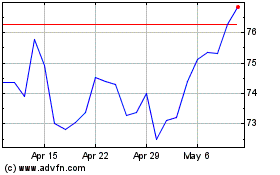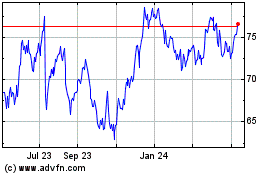Investors Brace for Brexit (and Not Just in the U.K.) -- Journal Report
March 03 2019 - 10:40PM
Dow Jones News
By Gerrard Cowan
While the precise date and nature of Brexit are up in the air,
investors should still be preparing themselves.
The date set for the U.K. to leave the European Union is March
29, though the terms of that departure remain unclear. Recent
political maneuvering as well, including the possibility of a new
referendum, leave open to question whether Brexit will occur at the
end of March -- or at all.
The possibility remains, nevertheless, that Britain at some
point will leave the European single market and customs union with
no provisional or substitute deal in place -- a so-called hard
Brexit -- which many believe would cause severe disruptions in
British trade with the Continent.
Matthew Bartolini, head of SPDR Americas Research at State
Street's State Street Global Advisors, says all investors should be
concerned even if they have no exposure to British or
Europe-focused funds. An exit without a deal, he says, could have
implications for the world economy, trade and supply chains, with
particular impact on global equities, bonds and foreign
exchange.
Mr. Bartolini suggests that investors look at what happened
after the referendum in June 2016 in which Britain voted to leave:
Small-cap U.S. stocks, which are domestically focused, fell 7%, as
measured by the Russell 2000 index. "That shows how Brexit-related
volatility has a high probability of permeating the global
landscape," the analyst says.
A deal still could be struck that brings about an orderly exit,
Mr. Bartolini says, which would be a boon for stocks and other
assets in the region.
Funds' preparations
So how should investors plan in the midst of such
uncertainty?
A spokesperson for mutual-fund giant Vanguard Group says, "It's
important to note that Brexit negotiations have been going on for
quite some time now," and markets have already priced much of the
uncertainty that exists into the funds. New uncertainty in the U.K.
and Europe could spill over to global financial markets, posing
particular concerns for U.S. investors with exposure to those
regions. But an investor's best bet in such an environment is to
"control the controllable," the spokesperson says, through
maintaining a diversified portfolio of stocks and bonds with both
domestic and international exposure.
Chris Dhanraj, head of U.S. iShares investment strategy at
BlackRock, says that historically, activity in exchange-traded
funds has risen during periods of heightened geopolitical risk and
market uncertainty, with the funds providing a possible source of
liquidity and price discovery as events play out. His firm
recommends that investors analyze their exposures to local currency
risk -- primarily in sterling and the euro -- and consider
currency-hedged funds as a viable alternative to minimize downside
risk.
Mr. Bartolini says that for diversification ahead of further
Brexit-inspired crises, investors should look at gold, which he
says has "proven to help during idiosyncratic risk events time and
time again." Another possibility, he says, is ETF options, which
could provide access to strategies that benefit from an uptick in
volatility no matter which direction the market takes.
Just another shock?
Elisabeth Kashner, vice president and director of ETF research
at FactSet, advises investors to be prepared for occasional
negative shocks in their portfolios by taking on only the level of
risk that they can handle financially and emotionally, and by
focusing on long-term goals. She cautions investors "to not be your
own worst enemy by changing investment strategies midcourse."
The funds are making preparations of their own. State Street
offers a range of Tactical Allocation ETF Portfolios, models
investors can use to structure their ETF holdings to achieve
particular outcomes ("Conservative," "Growth," etc.). Overall,
these portfolios are underweight Europe relative to the firm's
strategic allocation weights, the baseline it uses to design the
models before factoring in events like Brexit.
The Vanguard spokesperson says regardless of the outcome, "We
continue to believe the U.K. market will offer positive
diversification benefits to investors."
Mr. Cowan is a writer in Northern Ireland. He can be reached at
reports@wsj.com.
(END) Dow Jones Newswires
March 03, 2019 22:25 ET (03:25 GMT)
Copyright (c) 2019 Dow Jones & Company, Inc.
State Street (NYSE:STT)
Historical Stock Chart
From Jun 2024 to Jul 2024

State Street (NYSE:STT)
Historical Stock Chart
From Jul 2023 to Jul 2024
